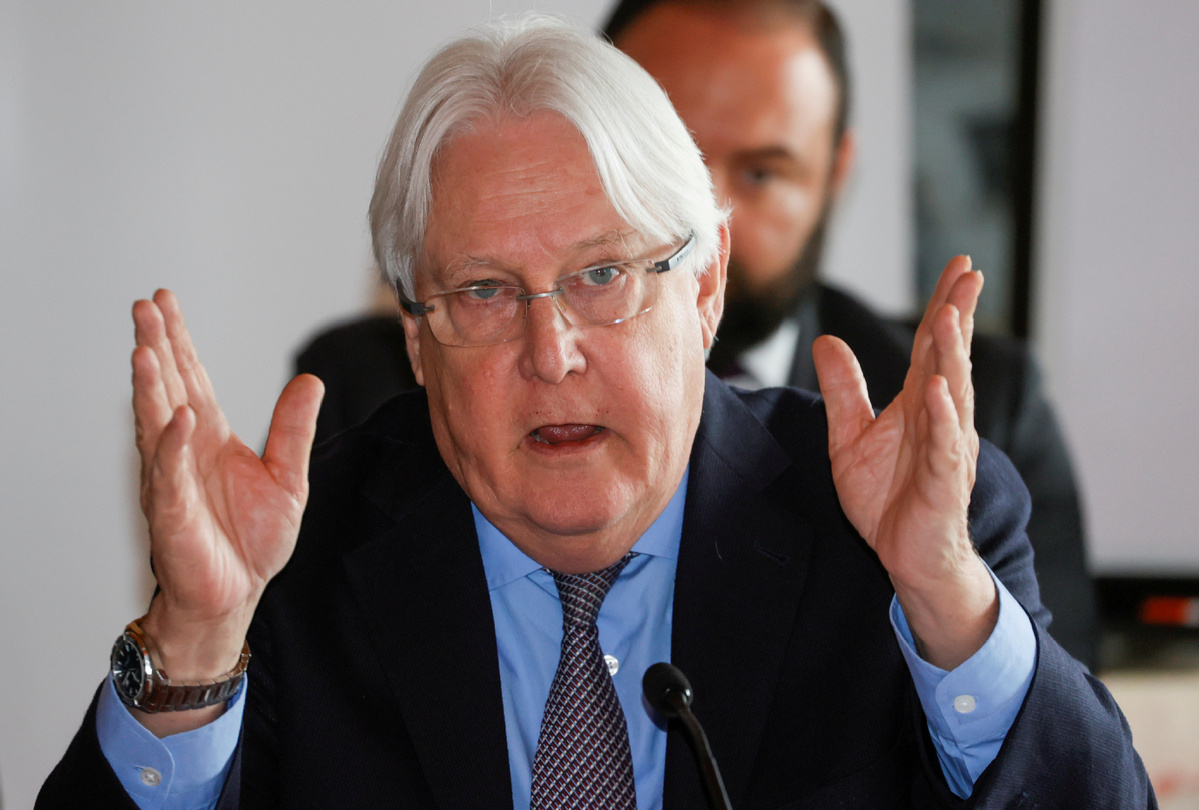UN fears US terrorist designation will make famine prospect worse in Yemen
Xinhua | Updated: 2021-01-15 10:10

UNITED NATIONS -- Senior UN officials on Thursday expressed their concerns over the potential impact of the decision by the United States to designate Yemen's Ansar Allah, more commonly known as the Houthi movement, as a terrorist group.
In his briefing to the virtual meeting, UN special envoy to Yemen Martin Griffiths told the Security Council that Yemen was going through dark times following a deadly attack last month on its newly-formed cabinet, and with millions facing potential famine, but emphasized peace is still possible.
Griffiths condemned the Dec 30 attack at the airport in Aden, which targeted the government officials who had just arrived from Saudi Arabia. Dozens of civilians, aid workers and a journalist were also killed.
"The attack cast a dark shadow over what should have been a moment of hope in the efforts to achieve peace in Yemen. The formation of the cabinet and its return to Aden was a major milestone for the Riyadh Agreement and for the stability of state institutions, the economy, and the peace process," he said.
"The government has launched an investigation into the Aden attack and has made its conclusions public earlier today that Ansar Allah was behind the attack."
For more than five years, Yemen has been mired in conflict between the internationally-recognized government, which is backed by a Saudi-led coalition, and Houthi rebels.
On Sunday, the United States announced that it will designate the group as a Foreign Terrorist Organization (FTO) under domestic law.
Griffiths expressed serious concern over this prospect.
"I am extremely concerned about the impact of the decision from the United States to designate Ansar Allah as a Foreign Terrorist Organization," he said.
"We fear that there will be inevitably a chilling effect on my efforts to bring the parties together. We all hope to have absolute clarity on far-reaching exemptions to be able to carry out our duties. In any event, I remain committed to engage with all parties, including Ansar Allah, designated or not, to end the conflict in Yemen," said the envoy.
UN Undersecretary-General for Humanitarian Affairs Mark Lowcock also expressed his concern over the famine prospect and the impact of the U.S. decision on it.
"The most urgent priority in Yemen right now is to prevent a massive famine," said Lowcock.
"The data show that 16 million people will go hungry this year. Already, about 50,000 people are essentially starving to death in what is essentially a small famine. Another 5 million are just one step behind them," he added.
Lowcock called for the FTO designation to be reversed, outlining its potential impact on aid relief in a country that overwhelmingly relies on food imports.
He explained that humanitarian agencies provide food vouchers or cash to needy Yemenis so they can shop at markets.
"Aid agencies cannot, they simply cannot, replace the commercial import system," he stressed. "What this means is that what the commercial importers do is the single biggest determinant of life and death in Yemen."
Lowcock reported that Yemenis are already rushing to markets to stockpile food, while commercial traders fear the designation will affect their operations.
"Some suppliers, banks, insurers and shippers are ringing up their Yemeni partners and saying they now plan to walk away from Yemen altogether," he said. "They say the risks are too high. They fear being accidentally or otherwise caught up in U.S. regulatory action which would put them out of business or into jail."
Although the United States plans to introduce licenses so that some aid and imports can continue, the relief chief said further details will not be available until Jan. 19, the day the designation takes force.
David Beasley, head of the World Food Programme (WFP), which was last year's winner of the Nobel Peace Prize, gave a blunt assessment of the prospects, putting aside his prepared remarks to speak "heart-to-heart."
"We are struggling now without the designation. With the designation, it's going to be catastrophic. It literally is going to be a death sentence to hundreds of thousands, if not millions, of innocent people in Yemen," said Beasley.
Beasley, an American, also removed his "UN hat" for a moment, to speak about his engagement with Washington, which allocated 3.75 billion U.S. dollars to WFP last year.
"I'm very grateful for that," he said. "But this designation, it needs to be re-assessed, it needs to be re-evaluated, and, quite frankly, it needs to be reversed."
Beasley added that Yemen is among several countries facing famine, and the COVID-19 pandemic has only exacerbated these crises.
The WFP chief called for Gulf states "to pick up the humanitarian financial tab for this problem in Yemen," and urged the Security Council and world leaders to apply pressure on the warring parties to end their fighting.
"I can assure you that Mark Lowcock and I will be before you pretty soon talking about other countries," he said. "And if we can't solve this one - this is man-made completely - shame on us."
























